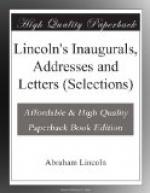(2) That, “subject to the Constitution of the United States,” neither Congress nor a Territorial Legislature can exclude slavery from any United States Territory. This point is made in order that individual men may fill up the Territories with slaves, without danger of losing them as property, and thus to enhance the chances of permanency to the institution through all the future.
(3) That whether the holding a negro in actual slavery in a free State makes him free as against the holder, the United States courts will not decide, but will leave to be decided by the courts of any slave State the negro may be forced into by the master. This point is made, not to be pressed immediately; but, if acquiesced in for a while, and apparently indorsed by the people at an election, then to sustain the logical conclusion that what Dred Scott’s master might lawfully do with Dred Scott, in the free State of Illinois, every other master may lawfully do with any other one, or one thousand slaves, in Illinois, or in any other free State.
Auxiliary to all this, and working hand in hand with it, the Nebraska doctrine, or what is left of it, is to educate and mould public opinion, at least Northern public opinion, not to care whether slavery is voted down or voted up. This shows exactly where we now are; and partially, also, whither we are tending.
It will throw additional light on the latter, to go back and run the mind over the string of historical facts already stated. Several things will now appear less dark and mysterious than they did when they were transpiring. The people were to be left “perfectly free,” “subject only to the Constitution.” What the Constitution had to do with it outsiders could not then see. Plainly enough now, it was an exactly fitted niche for the Dred Scott decision to afterward come in, and declare the perfect freedom of the people to be just no freedom at all. Why was the amendment, expressly declaring the right of the people, voted down? Plainly enough now, the adoption of it would have spoiled the niche for the Dred Scott decision. Why was the court decision held up? Why even a Senator’s individual opinion withheld till after the presidential election? Plainly enough now, the speaking out then would have damaged the perfectly free argument upon which the election was to be carried. Why the outgoing President’s felicitation on the indorsement? Why the delay of a reargument? Why the incoming President’s advance exhortation in favor of the decision? These things look like the cautious patting and petting of a spirited horse preparatory to mounting him, when it is dreaded that he may give the rider a fall. And why the hasty after-indorsement of the decision by the President and others?




